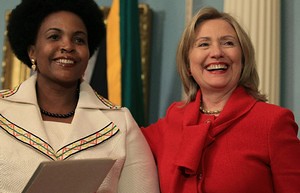
Republic of South Africa Foreign Minister Maite Nkoana-Mashabane and United States Secretary of State Hilary Clinton discuss issues in Washington. After WikiLeaks, the U.S. is anxious to be seen with African leaders., a photo by Pan-African News Wire File Photos on Flickr.
Beware of ‘virtual colonialism’
Saturday, 17 September 2011 20:09
By Johnson Ali Mikuku
Zimbabwe Herald
SINCE the past century, the Western powers have gone to great lengths to dominate the world militarily, politically and economically.
These activities include espionage, remote influencing of events and individuals, and the manufacture and deployment of psychotronic weapons.
In recent decades the world has witnessed unprecedented technological advancement, particularly in communication.
From invention of radio and television to the rise of 24-hour television networks broadcasting latest news live and across the globe, all have been making the world a small place by reducing distances.
As information technology advanced, we have been experiencing “virtual feudalism” in which overlapping communities constitute multi-layered identity and citizenships.
Today the world is witnessing virtual colonisation which is the newest form of colonialism.
While classical colonialism targeted the physical world and neo-colonialism targeted its cultures, virtual colonialism has dominated all aspects of human existence such as everyday life, sciences, innovations, ideas, and norms.
This has been possible because virtual empires are interactive, user-oriented, ubiquitous, continuously updated, managed through both centralised and dispersed schemes, and employ the latest digital technologies.
Virtual space (Internet) acts as a tool for soft power and soft power is the reference for generating virtual space.
Soft power acts in a field of colonialism and fermentation, where “countless users” are the main generators of power with “the enemies of humanity”.
Virtual social networks such as Facebook and Tweeter are important tools to exert soft power. Soft power is the power to change the demands and expectations of a society towards the direction that is desired by the holder of the power.
Being aware of the great potentialities embedded in virtual space, some institutions have managed to establish “virtual empires” (Google, Yahoo, Facebook, YouTube, MSN and Tweeter) through which they have managed to successfully exert their global cultural, political, and economic hegemony.
Needless to say this hegemony has provided the Western countries, particularly the United States, with enormous power.
One who steps into the virtual world today get acquainted with a new language that creates for him/her a new world. In this language, and as a result of the new world, “cultural objects” (like concepts of human, customer, and so on) and “human relationship” (like family relationships) change and come to exist in a new form (the Westernisation of Internet users).
Imam Khomeini, the leader of the Islamic Revolution of Iran, is one leader who paid equal attention to soft power, its techniques and tools in his discourses. Wise and sagacious as he was, Imam Khomeini predicted that soft power would be one of the most important tools the West would use to advance their imperialistic motives.
Calling the attention of the friends of the Islamic Revolution, Imam Khomeini said they must be afraid of cultural dependency, not the West’s military power. “My dears, we are not afraid of economic sanctions, we do not fear the enemy’s military invasion, we are only afraid of cultural dependency, we fear colonial university”.
Thus according to Imam Khomeini, cultural dependency is one of the most important goals the West is trying to realise through monopoly of virtual space.
The essence of this article is not to scandalise the use of the Internet, since the writer acknowledges the beneficial services it offers, but the main concern is to comprehend the covert and overt facets of virtual colonialism underlined by the outstanding monopoly of the West’s virtual empires such as Yahoo, Facebook, MSN, Tweeter and YouTube in shaping the dominant political, cultural, and economic atmosphere in virtual space.
These empires play a key role in transmitting fundamental Anglo-Saxon political, cultural and economic values like liberalism, democracy, freedom, human rights, pluralism, individualism, free trade, and so on.
Virtual empires play a major role in shaping cultural and political discourse. The dominant discourse in these empires is the Anglo-Saxon discourse that propagates political and cultural values. Since the West is powerful in Internet media space, whatever it produces is usually welcomed with open arms as reliable news.
In these media, the West and Western governments are represented as the symbols of freedom and human rights whereas the Third World and Moslem states are depicted as the symbol of autocracy and vicious states which are in desperate need of the West to achieve so-called Western-style liberal democracy. For example, Google acquires all of its news from Anglo-Saxon news agencies such as Associated Press, Reuters, Fax News, CNN, New York Times, and BBC. As a result, it strengthens the agenda of Western news discourse.
Social media such as Tweeter, Facebook, YouTube create systems which are far more powerful than traditional media like television and newspapers. Through these platforms, the West skilfully shapes its agenda and wields immense powers of control and manipulation.
The writer, Johnson Ali Mikuku, is the president of the Zimbabwe National Association of Muslim students.
No comments:
Post a Comment